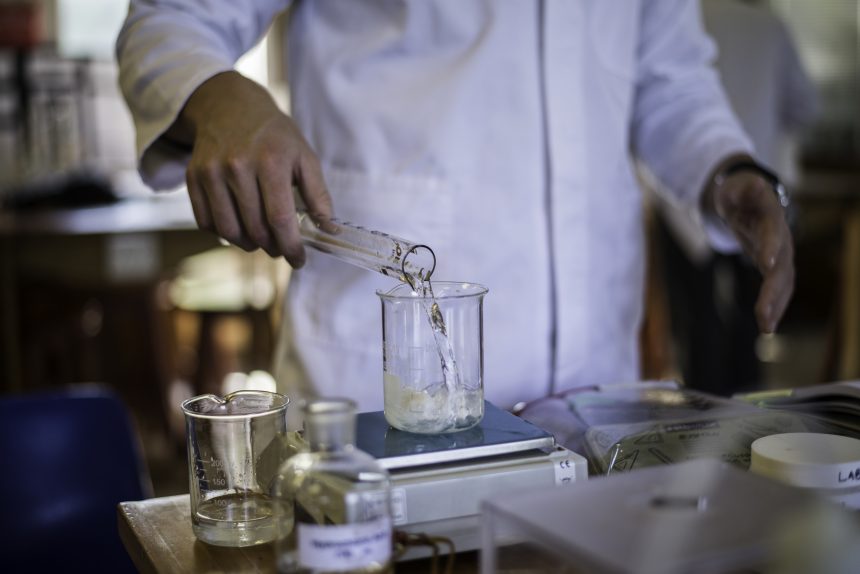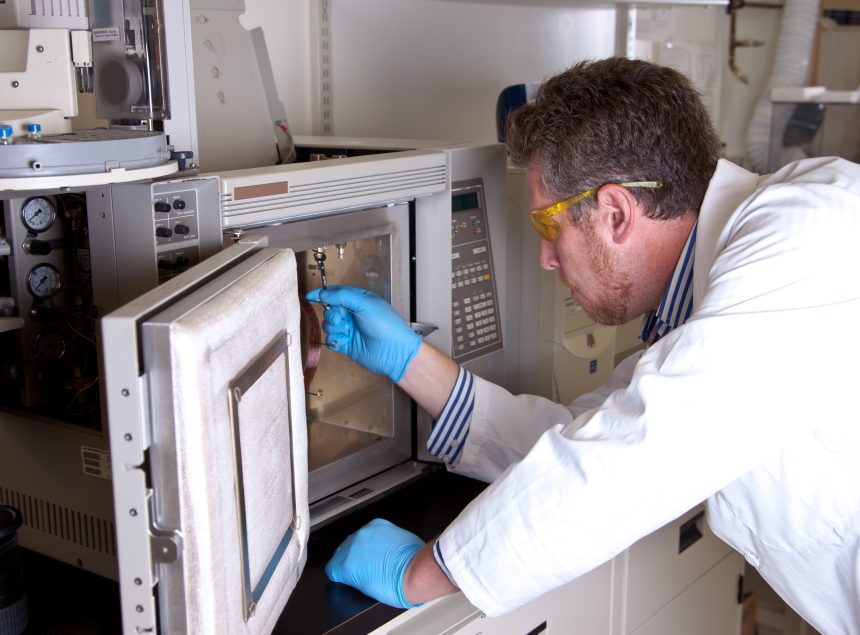Contents:
- What content is covered in A Level Chemistry?
- How is A Level Chemistry assessed?
- Is A Level Chemistry hard?
- What grades do you need to do A Level Chemistry?
- What skills will you develop when studying A Level Chemistry?
- Where can A Level Chemistry lead you?
- What subjects go well with A Level Chemistry?
- Do you need to study A Level Maths alongside A Level Chemistry?
What content is covered in A Level Chemistry?
A Level Chemistry explores how different materials react with each other and how these reactions govern our physical world.
You’ll begin by learning core concepts and practical skills to give you a strong foundation upon which to develop your knowledge. You’ll typically cover:
- Foundations in chemistry – atomic structure, bonding and intermolecular forces, shapes of molecules, the periodic table, etc.
- Organic chemistry – carbon-based molecules and their reactions
- Physical chemistry – reaction rates, redox reactions, buffers, energies of systems, transition metals, etc.
- Analytical chemistry – functional group analysis, chromatography, instrumental analysis, etc.
Across all exam boards, there is a strong focus on mathematical skills and practical techniques. During your studies, you will build confidence in these areas.

How is A Level Chemistry assessed?
The assessment format of your Chemistry A Level course will depend on your exam board. Typically, you can expect to sit 3× written exams:
- 2× exams assessing module-specific content. These are made up of multiple choice, structured questions, and extended response questions.
- 1× exam assessing content and skills across the whole course. This is made up of structured and extended response questions only.
You’ll also need to complete a series of hands-on experiments in the lab that relate to the topics you learn in class. These experiments help you earn a ‘Practical Endorsement’ in chemistry.
The Practical Endorsement won’t count towards your final grade, but it’s generally needed if you plan to study chemistry or a related course at university.
Is A Level Chemistry hard?
A Level Chemistry is typically considered a challenging course because it is content-heavy and delves into advanced and complex topics. It requires a high level of mathematical ability, which some students find difficult.
The exams for A Level Chemistry are particularly demanding due to the mark scheme specificity. In 2023, only 8.2% of A Level Chemistry students achieved an A* and 22.1% received an A.
However, it is important not to be discouraged by these statistics. Many students find A Level Chemistry to be an exciting and rewarding subject. You have two years to learn the content and with lots of past paper practice, you will master exam technique.
If you have a genuine interest in chemistry and are willing to put in extra effort to study and practice, you can certainly succeed.

What grades do you need to do A Level Chemistry?
To study A Level Chemistry, most sixth forms and colleges will require students to have achieved:
- At least Grade 4 in five GCSEs, including English Language
- Grade 5 or above in GCSE Maths – approximately 20% of the marks in A Level Chemistry exams require the use of mathematics, so you’ll need to be confident in fundamental maths skills
- Grade 5 or above in GCSE Chemistry
Check the specific course prerequisites on the website of the school or college you’re intending to study at or contact their admissions team directly.
What skills will you develop when studying A Level Chemistry?
Studying A Level Chemistry will help you develop transferable skills such as scientific method, experimental design, and data analysis. You will learn to evaluate complex scientific problems and to apply scientific concepts to real-world situations.
A Level Chemistry fosters strong laboratory and practical skills, improving precision, attention to detail, and the ability to conduct experiments effectively and safely. You will also develop strong mathematical and numerical skills, essential in a wide range of other academic and professional fields.
Top tips for studying A Level Chemistry
- Break it down – Chemistry is content-heavy, so it can be helpful to break down everything you need to learn. Concentrate on one topic at a time and identify key facts or trigger words to help you remember. By making these connections, you can make the content seem less overwhelming and more manageable.
- Scrub up on your GCSE Maths – Although there’s a lot of mathematical content, most of it uses arithmetic and algebraic manipulation taught at GCSE. Make sure you’re familiar with it, and you’ll be in good shape for the mathematical side of the course.
- Quiz your friends – The most effective way to grasp a concept is by teaching it to someone else. Gather some friends and switch roles as both the teacher and learner. One person can use flashcards to ask questions, while the other can test their memory by recalling the answers.
- Identify what you need to memorise – Focus your revision efficiently by identifying which formulae and equations you’re required to remember. There’s no point learning equations that you’ll be provided in the exam.
- Look at the specification – Refer to your exam board’s specification, which outlines everything you need to know and might be tested on in the exam. Review this document regularly to monitor your progress.
Where can A Level Chemistry lead you?
It is useful to study A Level Chemistry if you’re looking to take a Medicine, Healthcare, or Natural Science course at university. Many Geography, Earth Science, and Geology courses similarly require a science A Level, and chemistry can support you in these fields.
A Level Chemistry can serve as an important stepping stone towards many exciting STEM careers. Some of the less obvious fields include:
- Biotechnology
- Forensic science
- Life sciences
- Environmental science
- Pharmacology
- Chemical engineering
- Food technology
- Toxicology
- Accounting
You might opt to study one of these specialisms at university, or you could keep your options open by studying a ‘broader’ course like Chemistry or Biochemistry.

What subjects go well with A Level Chemistry?
Chemistry, biology, and maths is the most popular trio of A Level subjects, followed by chemistry, physics, and maths. These A Level combinations provide students with an understanding of core scientific principles and enhance their problem-solving and analytical thinking skills, opening up various academic and career pathways within STEM fields.
Chemistry also pairs well with further mathematics and psychology.
Do you need to study A Level Maths alongside A Level Chemistry?
If you’re hoping to study a science, technology or engineering course at university, then a lot of universities may require (or highly recommend) A Level Maths.
A lot of mathematical knowledge is expected in A Level Chemistry, so you will find some aspects of the course significantly more challenging if you have not studied A Level Maths.
If you’re certain that A Level Maths isn’t for you, you could take AS Level Maths or pursue a Free Standing Maths Qualification (FSMQ) to ensure you’re well prepared for the mathematical requirements of your chemistry course. Additionally, there are books (such as CGP’s ‘Essential Maths Skills for A Level Chemistry’) tailored for chemists who don’t take A Level Maths.


Comments